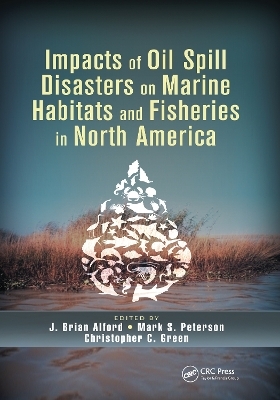
Impacts of Oil Spill Disasters on Marine Habitats and Fisheries in North America
CRC Press (Verlag)
978-0-367-65897-7 (ISBN)
At an increasingly global scale, aquatic scientists are heavily entrenched in understanding the fate of marine ecosystems in the face of human-altered environments. Oil spill disasters, especially large-scale ones like the 2010 Deepwater Horizon tragedy, have left uncertain and indelible marks on marine ecosystems.
Impacts of Oil Spill Disasters on Marine Habitats and Fisheries in North America contains independent scientific findings and critical reviews from experts researching the impacts of the Exxon Valdez, Ixtoc I, and Deepwater Horizon oil spills on coastal fishery resources. Comprised of three sections, this seminal work:
Details the physiological effects of oil-derived compounds on fishes, presenting results from field and laboratory investigations
Addresses the science of assessing the impacts of oil spills and oil response measures on coastal habitats, with an emphasis on salt-marsh ecosystems in the Gulf of Mexico
Explores the quantified and potential impacts of oil spills on population and community dynamics of commercial and recreational fishery species
Provides newly released results from the 25-year recovery of marine mammals, birds, and fishes following the Exxon Valdez spill
Chapters discuss new techniques for collecting and processing blood samples for toxicity testing, new aerial radar techniques for detecting unseen oil on marshes, consequences of oil prevention measures (such as diverting fresh water to estuaries or building sand berms to stop oil) on coastal fishery resources, and non-traditional methods for assessing the herring stock in Prince William Sound, Alaska, USA following the Exxon Valdez disaster.
J. Brian Alford is currently an assistant professor at The University of Tennessee, Knoxville, USA. He holds a BS and MS from the University of Southern Mississippi, Hattiesburg, USA, and a Ph.D from Mississippi State University, Starkville, USA. He previously worked as an environmental scientist for the Mississippi Department of Environmental Quality, Jackson, USA; field technician at North Carolina State University, Raleigh, USA; research coordinator at Mississippi State University for assessing post-Hurricane Katrina restoration of catfish and largemouth bass fisheries in the Pascagoula River Basin; and fisheries research biologist for the Louisiana Department of Wildlife and Fisheries, Baton Rouge, USA. Mark S. Peterson is a professor at The University of Southern Mississippi, Ocean Springs, USA. His current research projects in the university’s Gulf Coast Research Laboratory include: developing ecosystem-based management tools (field monitoring, GIS, modeling) to evaluate habitat use and recruitment success of fishes in coastal ecosystems; evaluating the influence of altered/fragmented, partially-altered/fragmented, and near-pristine salt-marsh tidal creeks on diversity, community structure, and food web structure of fishes using traditional and stable isotope methodology; quantifying size-related movement patterns and critical habitat characteristics of threatened Gulf sturgeon including large-scale connectivity of eastern and western populations; and more. Christopher C. Green is an associate professor at Louisiana State University (LSU), Baton Rouge, USA. He holds a BS from the University of Oklahoma, Norman, USA; MS from the University of Arkansas at Pine Bluff, USA; and Ph.D from Southern Illinois University, Carbondale, USA. Dr. Green’s lab at the LSU Agricultural Center (AgCenter) focuses on applied reproductive fish physiology and endocrinology, with an emphasis on freshwater and estuarine aquaculture species. A popular reviewer, Dr. Green has served on the editorial board of the North American Journal of Aquaculture and as co-editor of the second edition of Cryopreservation of Aquatic Species.
Multiple Effects of Oil and Its Components in Fish. Toxicological and Physiological Effects of the Surfactant Dioctyl Sodium Sulfosuccinate at Varying Salinities During Larval Development of the Gulf Killifish (Fundulus grandis). Endocrine Disruption as a Mechanism of Action Underlying Sublethal Effects in Pacific Herring (Clupea harengus pallasi) Exposed to the Dissolved Hydrocarbon Fraction of Crude Oil. Proper Handling of Animal Tissues from the Field to the Laboratory Supports Reliable Biomarker Endpoints. Early Review of Potential Impacts of the Deepwater Horizon Oil Spill on Gulf of Mexico Wetlands and Their Associated Fisheries. A Brief Review of the Effects of Oil and Dispersed Oil on Coastal Wetlands Including Suggestions for Future Research. Oil Contamination in Mississippi Salt Marsh Habitats and the Impacts to Spartina alterniflora Photosynthesis. City, County, and State Methods to Protect Nearshore Fisheries Habitat in Mississippi During the Deepwater Horizon Oil Spill. Lessons from the 1989 Exxon Valdez Oil Spill: A Biological Perspective. The Exxon Valdez Oil Spill and the Collapse of the Prince William Sound Herring Stock: A Reexamination of Critical Biomass Estimates. Effects of the Ixtoc I Oil Spill on Fish Assemblages in the Southern Gulf of Mexico. Impacts of the Deepwater Horizon Oil Spill on the Reproductive Biology of Spotted Seatrout (Cynoscion nebulosus). Impacts of the Deepwater Horizon Oil Spill on Blue Crab, Callinectes sapidus, Larval Settlement in Mississippi. Oyster Responses to the Deepwater Horizon Oil Spill across Coastal Louisiana: Examining Oyster Health and Hydrocarbon Bioaccumulation. Occurrence of Lemon Sharks (Negaprion brevirostris) at the Chandeleur Islands, Louisiana, before and after the 2010 Deepwater Horizon Disaster.
| Erscheinungsdatum | 01.10.2020 |
|---|---|
| Reihe/Serie | CRC Marine Biology Series |
| Verlagsort | London |
| Sprache | englisch |
| Maße | 178 x 254 mm |
| Gewicht | 453 g |
| Themenwelt | Medizin / Pharmazie ► Medizinische Fachgebiete ► Arbeits- / Sozial- / Umweltmedizin |
| Studium ► Querschnittsbereiche ► Klinische Umweltmedizin | |
| Naturwissenschaften ► Biologie ► Biochemie | |
| Naturwissenschaften ► Biologie ► Limnologie / Meeresbiologie | |
| Naturwissenschaften ► Chemie | |
| Weitere Fachgebiete ► Land- / Forstwirtschaft / Fischerei | |
| ISBN-10 | 0-367-65897-6 / 0367658976 |
| ISBN-13 | 978-0-367-65897-7 / 9780367658977 |
| Zustand | Neuware |
| Haben Sie eine Frage zum Produkt? |
aus dem Bereich


